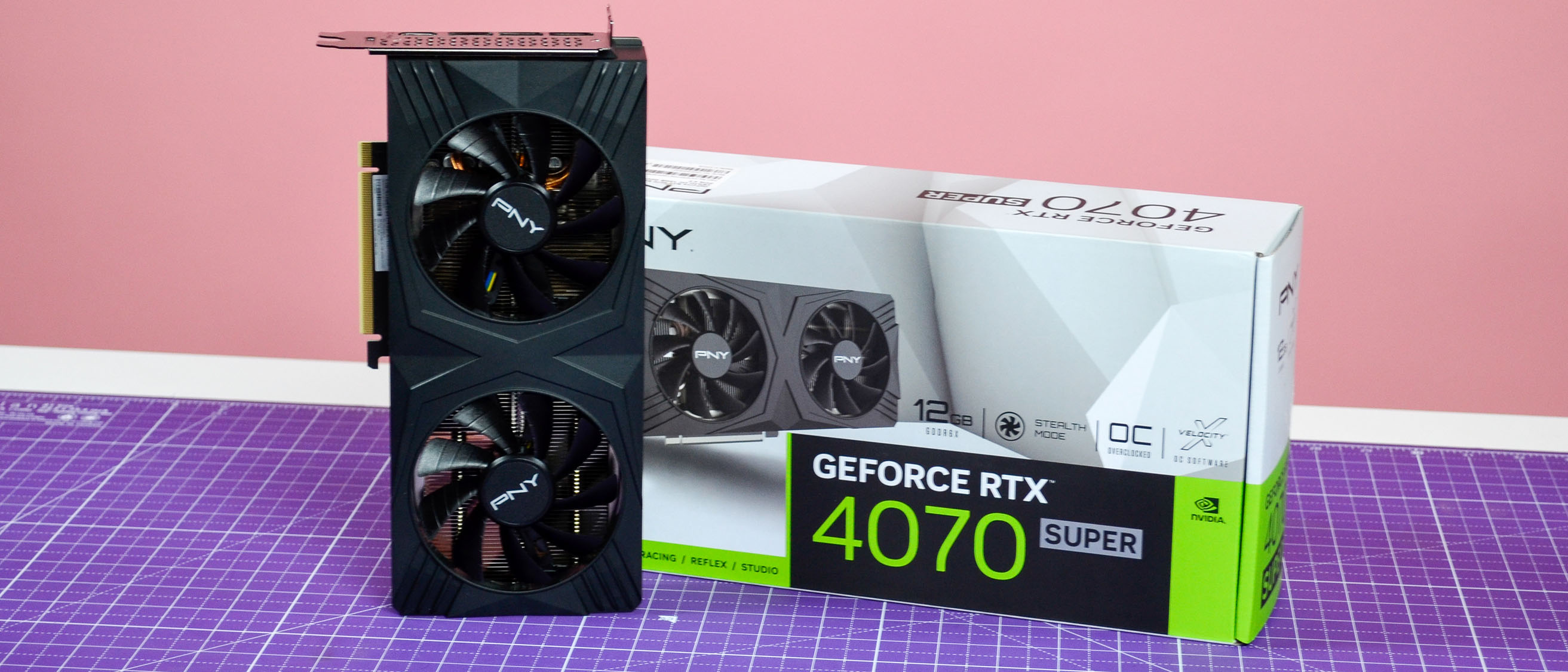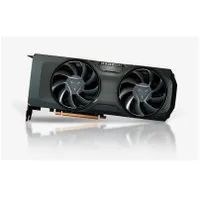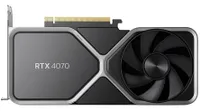TechRadar Verdict
The PNY GeForce RTX 4070 Super Verto OC is an excellent version of an already excellent graphics card, featuring a tweaked boost clock speed, superb cooling, and additional software features to help push this card to its limit.
Pros
- +
Overclocked
- +
Great cooling
- +
Slim design
Cons
- -
12VHPWR connector or adapter required
- -
No RGB (but that might be a plus for some)
Why you can trust TechRadar
PNY GeForce RTX 4070 Super Verto OC: Two-minute review
The PNY GeForce RTX 4070 Super Verto OC is another solid entry into the Nvidia Lovelace family from PNY, and gamers or creators (or both) looking for a little extra performance for their money will very pleased if they bought this card.
With a US MSRP of $599.99 (about £480/AU$840), this card sells for the same as the Founders Edition in my Nvidia GeForce RTX 4070 Super review, but it comes with a few nifty extras that make an already excellent graphics card even better.
In the main, this comes from the slightly faster factory boost clock of 2,490 MHz, up from the Founders Edition's 2,475 MHz boost. To be clear, this is only 0.60% faster, so the actual performance in real terms is a couple of points here, a frame or two there, and isn't the kind of thing that you're going to really notice even if you have the benefit of having both cards to test side-by-side like I do (if you want to see raw performance numbers vis-a-vis the competition, check out the Founders Edition review and tack on about 0.5% to the RTX 4070 Super's scores, more or less).
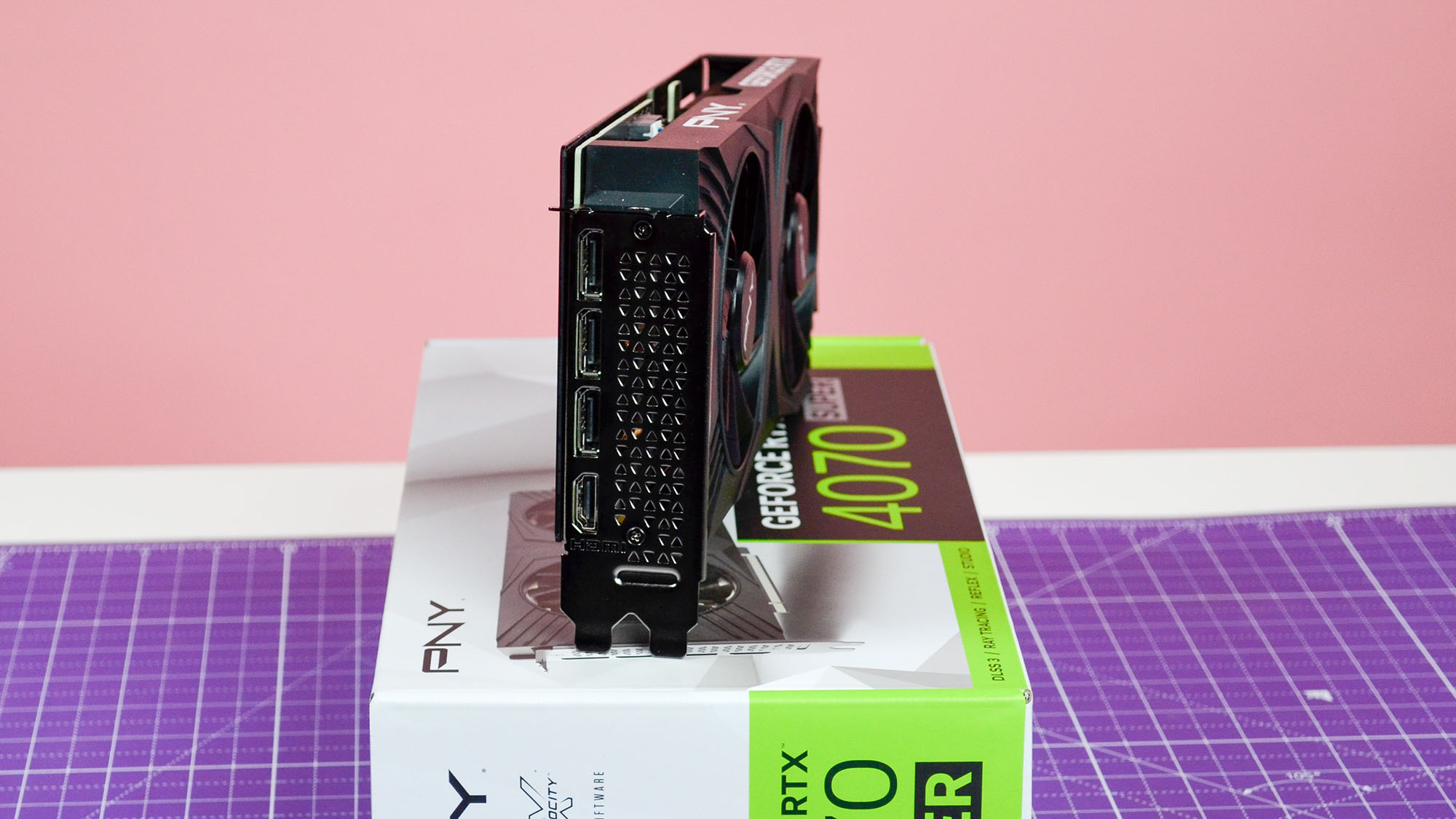
That said, extra performance is extra performance, however small, and with the PNY RTX 4070 Super Verto OC, you get a little bump in performance right out of the box. After that, you also have the PNY VelocityX overclocking software, where you can take things a good bit further, especially thanks to the 12VHPWR cable allowing for some extra wattage into the GPU.
That said, anytime you're overclocking any computer hardware yourself, either through a software tool or otherwise, do be careful not to push things too far and potentially damage your card. At $600, this is still a good investment.
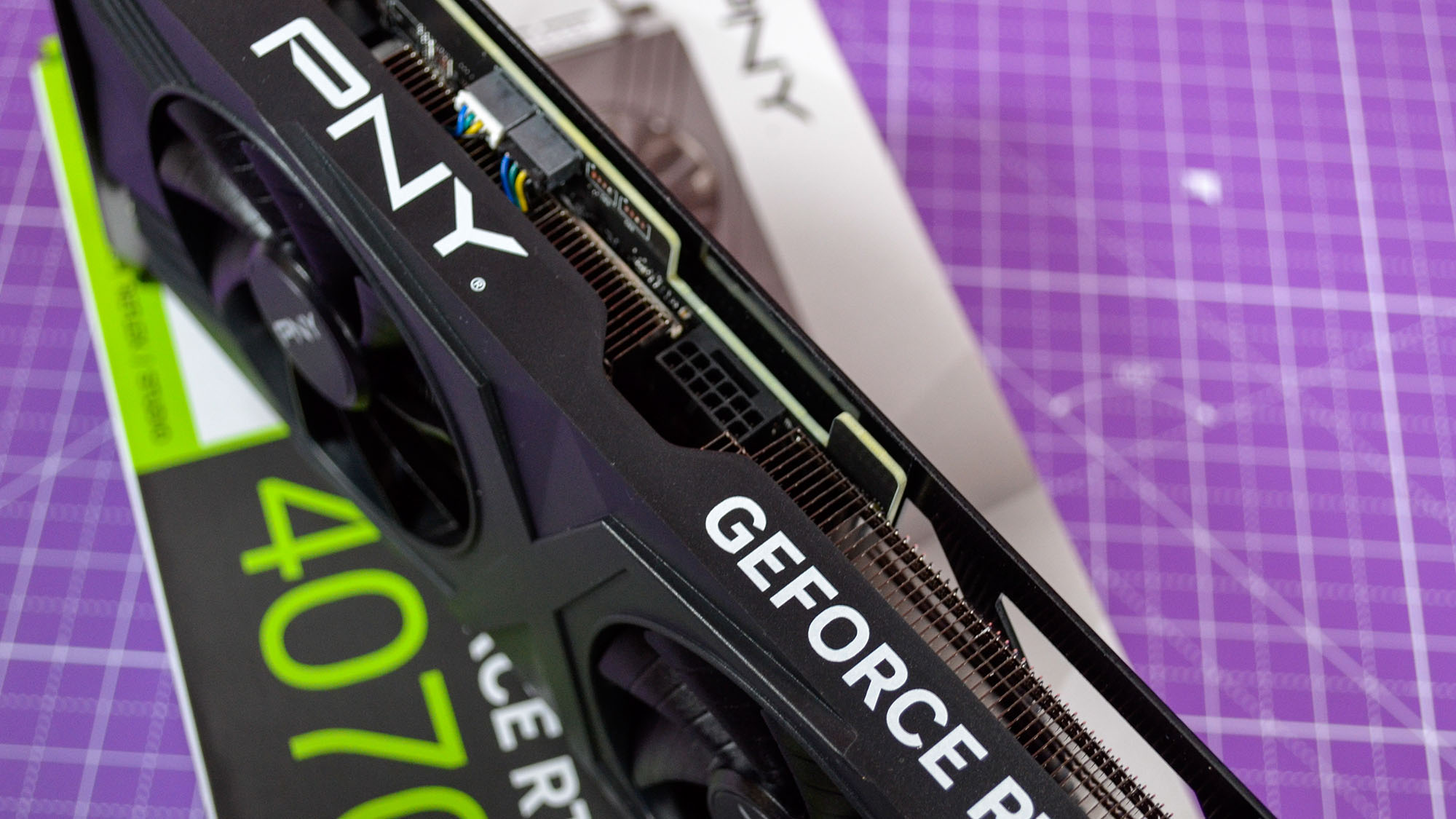
In terms of design, the dual-fan shroud for the PNY Verto series is the same as it is on other cards, but that's not terrible. It's not the flashiest design, but the dual fan design and exposed heatsink does allow for better cooling that is noticeable in my testing, which shows the PNY card running a few degrees cooler than the Founders Edition running the same 3DMark Speedway stress tests.
If there's one thing that I'm sad about its that with the 4070 Super, the 220W TGP means that you need to have either two 8-pin connectors or a 16-pin connector, so unlike the card in my PNY GeForce RTX 4070 XLR8 review that was able to sport a single 8-pin power connector, you're stuck with a 16-pin here.
Sign up for breaking news, reviews, opinion, top tech deals, and more.
There is an adapter in the box to let you plug two 8-pin cables into the card, but any time an adapter is involved, you're going to have to deal with some cable management issues.
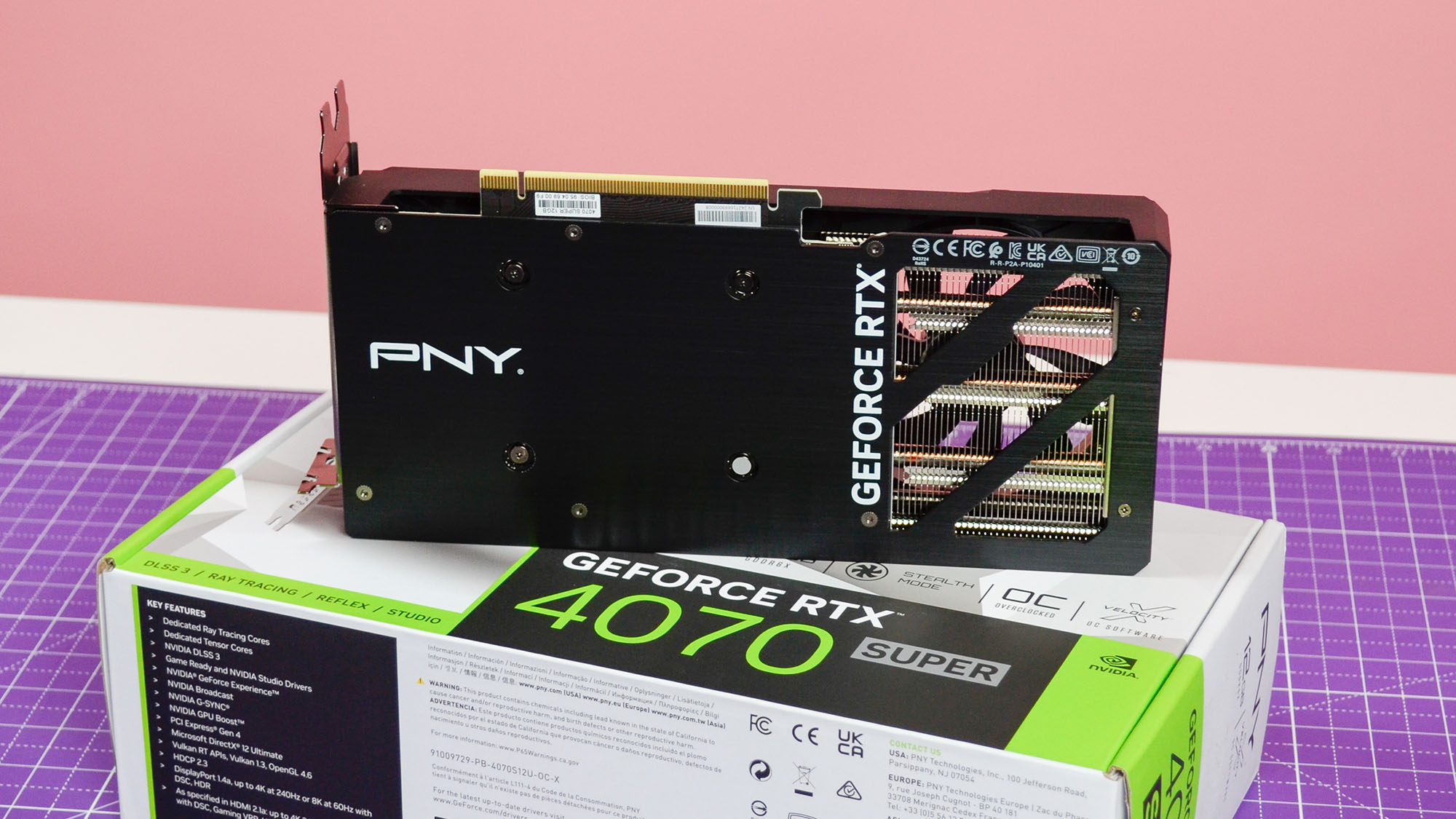
Beyond that, the PNY RTX 4070 Super Verto OC is a little bit longer and taller than the Founders Edition (9.74 inches vs 9.4 inches and 4.74 inches vs 4.3 inches), though they both take up about the same amount of slot space as a dual slot card.
The PNY card's extra length does give it a bit more heat sink to work with though, and the heatsink and fan overhang the PCB allowing for direct air passthrough for better cooling performance. Essentially, you'll be able to slot this card into just about any of the best PC cases that aren't special "mini" chasses without an issue and get some extra cooling performance in the process.
Wrapping up, the PNY GeForce RTX 4070 Super Verto OC is a solid choice for anyone looking to pick up an RTX 4070 Super thanks to some solid extras for the same price as MSRP. You won't get a whole lot of bling with it, but if what you're looking for is the best 1440p graphics card to play the best PC games or do some 3D modeling on the side, this card will get you the performance you need to make it happen.
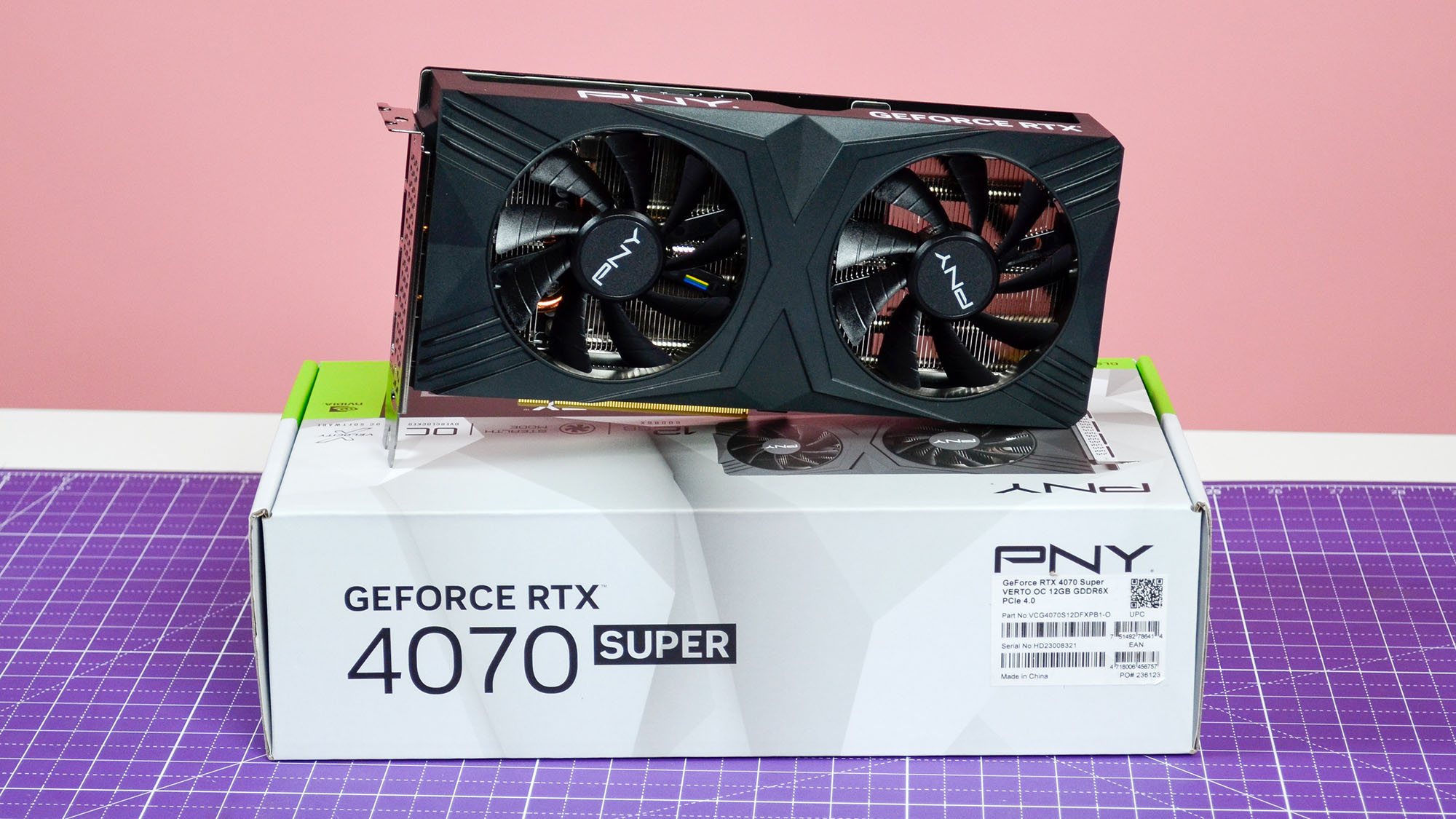
PNY GeForce RTX 4070 Super Verto OC: Price & availability
- How much is it? US MSRP $599 (about £480, AU$840)
- When is it out? January 17, 2024
- Where can you get it? You can buy it in the US, UK, and Australia
The PNY GeForce RTX 4070 Super Verto OC goes on sale on January 17, 2024, with a US MSRP of $599.99 (about £480, AU$840), and will be available in the US, UK, and Australia at launch or soon thereafter.
This puts it at the same MSRP as the Founders Edition card, which means you get some extra performance thrown in essentially for free, and the VelocityX overclocking software lets you tinker a bit with the card to squeeze out the best possible performance from this GPU.
In terms of other third-party GPUs, you're likely to find better cooling, flashier designs, and possibly better performance via OC settings, but for the price, the PNY RTX 4070 Super Verto OC is a great value for this GPU, even if it's pricier than the competing AMD Radeon RX 7800 XT.
PNY GeForce RTX 4070 Super Verto OC: Specs
| Header Cell - Column 0 | PNY RTX 4070 Super Verto OC | RTX 4070 Super | RTX 4070 |
|---|---|---|---|
| GPU | AD104-350-A1 | AD104-350-A1 | AD104-250-A1 |
| Compute Units | 56 | 56 | 46 |
| Shaders | 7,168 | 7,168 | 5,888 |
| Ray processors | 56 | 56 | 46 |
| AI/Tensor processors | 224 | 224 | 184 |
| Base clock | 1,980 MHz | 1,980 MHz | 1,920 MHz |
| Boost clock | 2,490 MHz | 2,475 MHz | 2,475 MHz |
| Memory clock | 1,313 MHz | 1,313 MHz | 1,313 MHz |
| Memory type | GDDR6X | GDDR6X | GDDR6X |
| Memory pool | 12 GB | 12 GB | 12 GB |
| Memory speed (effective) | 21 Gbps | 21 Gbps | 21 Gbps |
| Memory bandwidth | 504.2 GB/s | 504.2 GB/s | 504.2 GB/s |
| Bus interface | 192-bit | 192-bit | 192-bit |
| TGP | 220W | 220W | 200W |
| Power connector | 1 x 16-pin | 1 x 16-pin | 1 x 16-pin |
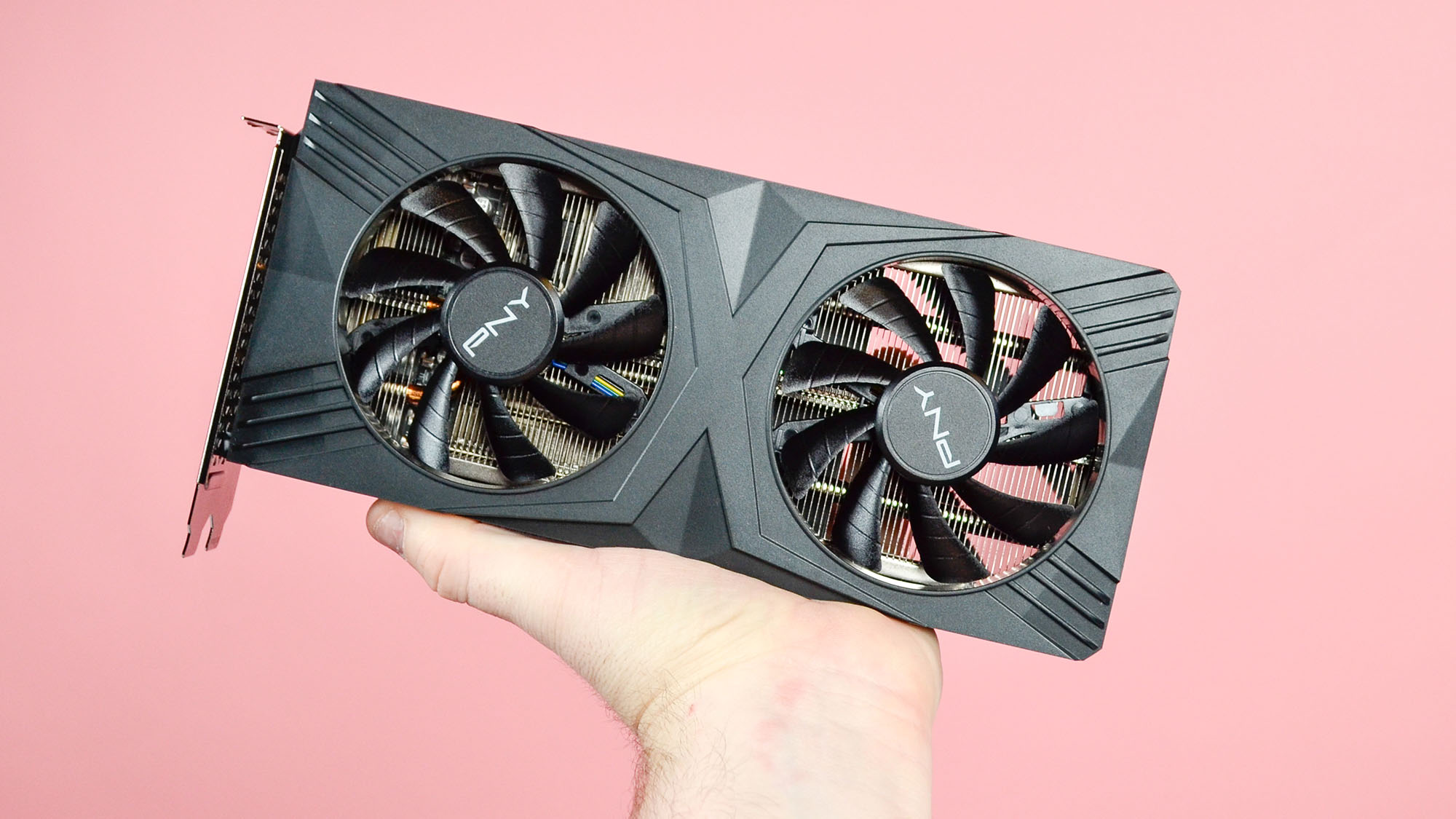
Should you buy the PNY GeForce RTX 4070 Super Verto OC?
| Value | For the same price as the Founder's Edition, the PNY RTX 4070 Super Verto OC adds value without additional cost. | 4.5 / 5 |
| Design | While fairly plain in terms of aesthetics, the lack of RGB might be seen as a plus, and the cooling solution is quite good. | 4 / 5 |
| Performance | While the extra boost clock speeds out the box aren't burning down the place, the VelocityX software allows for some tinkering to squeeze out the most performance possible. | 4.5 / 5 |
| Average rating | While the RTX 4070 Super Verto OC is still one of the priciest midrange cards on offer, the added extras over the RTX 4070 Super Founders Edition make it a strong recommendation if you're in the market for this GPU. | 4.34 / 5 |
Buy the PNY GeForce RTX 4070 Super Verto OC if...
You want an overclocked card for a great price
At MSRP, this card gives you both faster factory clocks as well as the ability to easily tweak your card's performance.
You want great cooling
The design of the RTX 4070 Super Verto OC lets air blow through part of the heatsink unobstructed, providing better cooling than the Nvidia Founders Edition.
Don't buy it if...
You want something flashy
The PNY Verto series isn't big on RGB, so if you want something shiny, this card isn't for you.
You're on a tight budget
Despite its extras, the PNY RTX 4070 Super Verto OC is still an expensive card, so you might want to check out the RX 7800 XT for great gaming performance at a better price.
PNY GeForce RTX 4070 Super Verto OC: Also consider
If my PNY GeForce RTX 4070 Super Verto OC review has you looking for other options, here are two more graphics cards to consider...
| Header Cell - Column 0 | PNY RTX 4070 Super Verto OC | Nvidia RTX 4070 | AMD RX 7800 XT |
|---|---|---|---|
| Price | $599.99 (about £480, AU$840) | $549.99 (about £440, AU$770) | $499.99 (about £380/AU$725) |
| GPU | AD104-350-A1 | AD104-250-A1 | Navi 32 |
| Compute Units | 56 | 46 | 60 |
| Shaders | 7,168 | 5,888 | 3,840 |
| Ray processors | 56 | 46 | 60 |
| AI/Tensor processors | 224 | 184 | 120 |
| Base clock | 1,980 MHz | 1,920 MHz | 1,295 MHz |
| Boost clock | 2,490 MHz | 2,475 MHz | 2,430 MHz |
| Memory clock | 1,313 MHz | 1,313 MHz | 2,425 MHz |
| Memory type | GDDR6X | GDDR6X | GDDR6 |
| Memory pool | 12 GB | 12 GB | 16 GB |
| Memory speed (effective) | 21 Gbps | 21 Gbps | 19.4 Gbps |
| Memory bandwidth | 504.2 GB/s | 504.2 GB/s | 620.8 |
| Bus interface | 192-bit | 192-bit | 256-bit |
| TGP | 220W | 200W | 263W |
| Power connector | 1 x 16-pin | 1 x 16-pin | 2 x 8-pin |
AMD Radeon RX 7800 XT
The AMD Radeon RX 7800 XT is arguably the best gaming GPU for most gamers, and given that it comes at a substantially lower price than the PNY RTX 4070 Super Verto OC, it's a hard card to ignore.
Read the full AMD Radeon RX 7800 XT review
Nvidia GeForce RTX 4070
The RTX 4070 isn't as fast as the PNY RTX 4070 Super Verto OC and it doesn't have as many processing cores, but it is still a powerful midrange graphics card that's going to be a lot cheaper now that the RTX 4070 Super has hit the shelves.
Read the full Nvidia GeForce RTX 4070 review
How I tested the PNY GeForce RTX 4070 Super Verto OC
- I spent about two days testing the PNY GeForce RTX 4070 Super Verto OC
- I tested its gaming performance and content creation performance specifically
- I used out standard battery of benchmark tests
Having tested the Nvidia GeForce RTX 4070 Super already, I looked into how much the PNY GeForce RTX 4070 Super Verto OC exceeded that baseline performance, and where it fell short, if applicable. I did this using a more precise series of benchmark tests that pushed the card's thermals to the limit, as well as repeatable synthetic benchmarks to determine comparable scores.
I also tinkered with PNY's VelocityX overclocking software to see how well that software affected the card's performance for better or worse.
I've been a hardware reviewer for many years now and I've spent more time at TechRadar's PC component test bench than I'd like to admit, so I know my way around graphics cards and what they ought to be capable of given their specs and pricepoints; knowledge that I leverage to its fullest to make sure that our customers get the best possible product for their money.
First reviewed January 2024
We pride ourselves on our independence and our rigorous review-testing process, offering up long-term attention to the products we review and making sure our reviews are updated and maintained - regardless of when a device was released, if you can still buy it, it's on our radar.

John (He/Him) is the Components Editor here at TechRadar and he is also a programmer, gamer, activist, and Brooklyn College alum currently living in Brooklyn, NY.
Named by the CTA as a CES 2020 Media Trailblazer for his science and technology reporting, John specializes in all areas of computer science, including industry news, hardware reviews, PC gaming, as well as general science writing and the social impact of the tech industry.
You can find him online on Bluesky @johnloeffler.bsky.social
